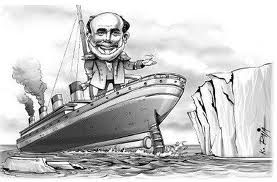“Punting the Pundits” is an Open Thread. It is a selection of editorials and opinions from around the news medium and the internet blogs. The intent is to provide a forum for your reactions and opinions, not just to the opinions presented, but to what ever you find important.
Thanks to ek hornbeck, click on the link and you can access all the past “Punting the Pundits”.
Ari Berman: Netroots to Obama White House: Where’s the Love?
Given the angst about the Obama administration at this year’s Netroots Nation conference-from the president’s policies on Afghanistan and civil liberties to his prioritization of deficit reduction over jobs-there was much speculation about what type of reception White House Communications Director Dan Pfeiffer would get during his appearance Friday morning. And sure enough, Daily Kos moderator Kaili Joy Gray-a k a “Angry Mouse”-grilled Pfeiffer about the president’s positions on jobs, gay marriage, Libya and his reluctance to fight back against the GOP and use his executive authority to circumvent Republican obstruction.
Things were testy from the start, when Gray asked Pfeiffer why Obama has not introduced a new jobs plan to boost the lagging economy. “It is a false decision to say we don’t have a jobs bill,” Pfeiffer responded. “We have a number of proposals in Congress that have been blocked by Republicans.” He pointed to a national infrastructure bank, a national wireless program, clean energy investments and tax credits for small businesses as examples. “You can expect the president will unveil a number of new initiatives,” Pfeiffer said when pressed on the issue.
John Nichols: Senate Democrats Should Have Embraced Surtax on Millionaires
North Dakota Senator Kent Conrad does not serve as a Democrat.
He serves as a Democrat-Non-Partisan League senator.
That’s a recognition of the fact that the North Dakota Democratic Party and the old Non-Partisan League, a radical grouping that challenged corporate interests and the wealthy elites(with a state-owned bank, publicly-run grain elevators and progressive taxation) merged in 1956.
Conrad, the chairman of the Senate Budget Committee, showed a little of his NPL side when he floated the very good idea of using a surtax on millionaires as a way to bring down budget deficits.
Few scholars of North Dakota politics would confuse the senator with the NPL activists of old. Conrad’s actually a budget hawk. But he reached into the NPL cabinet and found a good idea for balancing budgets and addressing deficits: taxing the rich.
Conrad reportedly considered a three-percent surtax on the wealthy as part of an effort by Conrad to gain the support of Vermont Independent Bernie Sanders, who serves on the committee and has argued that at least half of any deficit-reduction plan must be paid for with new revenue – as opposed to deep cuts to needed domestic programs.
Britain faces no serious threat, yet keeps waging war. While big defence exists, glory-hungry politicians will use it
Why do we still go to war? We seem unable to stop. We find any excuse for this post-imperial fidget and yet we keep getting trapped. Germans do not do it, or Spanish or Swedes. Britain’s borders and British people have not been under serious threat for a generation. Yet time and again our leaders crave battle. Why?
Last week we got a glimpse of an answer and it was not nice. The outgoing US Defense Secretary, Robert Gates, berated Europe’s “failure of political will” in not maintaining defense spending. He said NATO had declined into a “two-tier alliance” between those willing to wage war and those “who specialize in ‘soft’ humanitarian, development, peacekeeping and talking tasks”. Peace, he implied, is for wimps. Real men buy bombs, and drop them.
Danny Schechter: In Spain’s Tahrir Square: A Revolution Struggles to Be Born
MADRID, Spain — Spain is justly proud of the Paella, a distinctive dish that mixes diverse vegetables or seafood into a tasty fusion of delectability.
They have now created a political version in the form of Tahrir Square type encampment in Madrid’s Puerta del Sol where a diverse mix of activists—old, young, male-female, disabled, immigrant, activists from Western Sahara, have created a beachhead for what many say is the closest this country has come to a popular and distinctive revolutionary movement since the 1930’s.
Its been a month now since Real Democracy, a grass roots “platform,” as it called, began a march that initially only attracted a relative handful of activists but by the time it reached the shopping district at Puerta del Sol, it had swelled to over 25,000, surprising its organizers, participants and politicians from the two major parties.



 Conservatives are fond of claiming the United States as a “center-right country,” but public opinion polling routinely shows a country of people who amenable-if not enthusiastic-about liberal solutions to public policy problems. For example, in a recent Pew survey, when asked what they would support to cut the deficit, large majorities support a grab bag of liberal policies: raising the Social Security contribution cap, raising taxes on high-income earners, reducing our military presence, and limiting tax deductions for large corporations. . . . .
Conservatives are fond of claiming the United States as a “center-right country,” but public opinion polling routinely shows a country of people who amenable-if not enthusiastic-about liberal solutions to public policy problems. For example, in a recent Pew survey, when asked what they would support to cut the deficit, large majorities support a grab bag of liberal policies: raising the Social Security contribution cap, raising taxes on high-income earners, reducing our military presence, and limiting tax deductions for large corporations. . . . .

Recent Comments